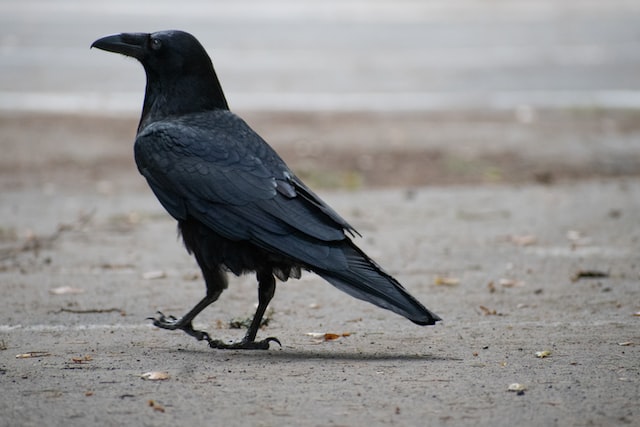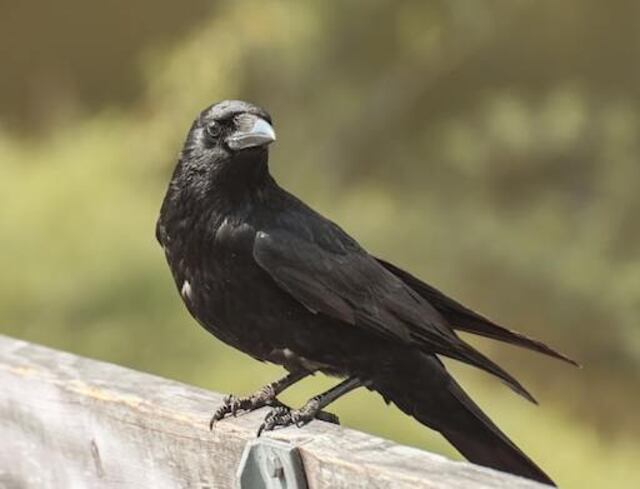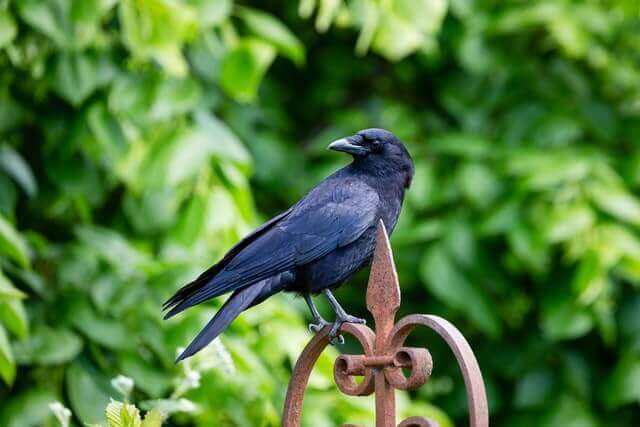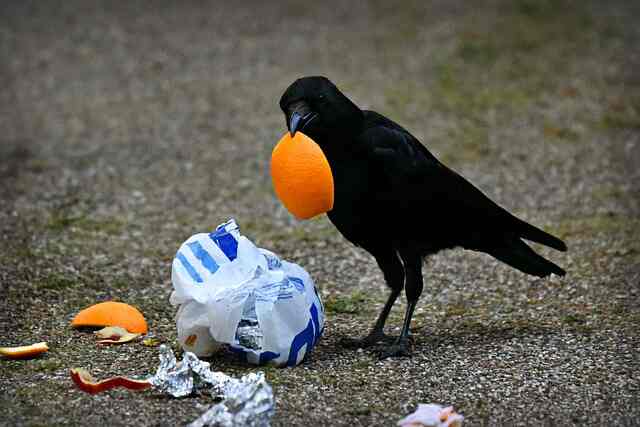Caw-caaw! Ever wondered, “What do crows eat?” Prepare for a captivating culinary adventure! These black, beaky critters have an insatiable appetite for everything under the sun. From bugs to berries, mice to munchies, crows devour it all!
In this article, we’ll explore their favorite snacks, winter diet changes, quirky drinking habits, and even foods to avoid.
So, whether you’re a bird enthusiast or just curious about these fascinating creatures, get ready for a comprehensive guide to the culinary preferences of our clever crow companions!
Table of Contents
What Do Crows Eat?
Crows have an omnivorous diet, consuming a wide range of foods. They feed on insects, small mammals, eggs, fruits, seeds, and carrion.
Their scavenging nature makes them adaptable to urban environments. Crows also exhibit tool usage, cracking nuts with rocks.
Their varied diet and intelligent behavior make them vital in controlling pests and maintaining ecological balance.

Overview of Crow Diet
The crow’s versatile palate includes a wide variety of foods, ranging from insects and small animals to fruits and seeds.
These black birds are omnivorous, meaning they eat both meat and plants. Their nutritional needs vary depending on the season, with more protein-rich foods consumed during breeding and migration.
They are known for their scavenging habits, often found rummaging through garbage cans and dumpsters in search of food.
Crows are also skilled foragers, using their intelligence and problem-solving abilities to obtain food from a variety of sources.
They have food preferences, such as a preference for carrion, but their diet can also vary based on availability.
Now, let’s delve into the wild crow’s food sources.
Foods Crows Eat
| Food Category | Examples |
|---|---|
| Insects | Beetles, caterpillars, grasshoppers |
| Small Animals | Mice, squirrels, rabbits |
| Carrion | Dead birds, rodents, roadkill |
| Fruits | Berries, apples, cherries |
| Seeds | Sunflower seeds, acorns, pumpkin seeds |
| Nuts | Walnuts, pecans, almonds |
| Eggs | Eggs from other birds’ nests |
| Grains | Corn, wheat, rice |
| Vegetables | Leafy greens, carrots, peas |
| Kitchen Scraps | Bread, cheese, meat scraps |
Wild Crow’s Food Sources
Wild crows have a ton of options when it comes to grub. They’re highly adaptable and skilled scavengers, with omnivorous tendencies that allow them to eat both plants and animals.
They’re constantly on the lookout for food availability, and their scavenging behavior means they’ll eat anything from insects and small mammals to fruits and seeds.
Their diet does vary seasonally, with fruits and insects being more abundant in the summer and fall. Winter months force crows to rely more heavily on scavenging and carrion.
Despite this, wild crows are able to find food in almost any environment, making them one of the most adaptable birds in the world.
With such a diverse and plentiful diet, it’s no wonder these birds are able to maintain their freedom and independence.
Speaking of their winter diet changes, let’s take a look at how crows adapt during the colder months.
| Season | Food Sources |
|---|---|
| Summer | Fruits, insects, small mammals |
| Fall | Fruits, insects, small mammals |
| Winter | Scavenging, carrion |
| Spring | Fruits, insects, small mammals |
During the summer and fall, wild crows have access to a variety of food sources, including fruits, insects, and small mammals.
As the winter months arrive, their diet shifts towards scavenging and feeding on carrion. In the spring, they return to a diet consisting of fruits, insects, and small mammals.
This dietary flexibility allows crows to adapt and find food in different environments, showcasing their remarkable adaptability.
Winter Diet Changes
As the cold winter months approach, crows’ diets undergo a significant change, forcing them to adapt and scavenge in unique ways.
Winter foraging requires seasonal adjustments as the available sustenance dwindles. Food scarcity is a challenge for crows, especially in areas where there are fewer human populations.
They may also adjust their migratory patterns to seek more plentiful food sources. To survive, crows turn to various sources of food, including seeds, nuts, berries, and fruits.
They also scavenge for insects, small animals, and carrion. To help them locate food, they use their keen sense of smell and eyesight.
Winter also brings a shortage of drinking water, so crows rely on snow or ice to hydrate themselves.
It’s important to remember that crows are intelligent and resourceful birds that can adapt to their environment.
As the winter diet changes, they will find a way to survive. Speaking of survival, let’s now take a look at how crows quench their thirst.
| Winter Diet Changes | Adaptations | Characteristics | Thirst Quenching |
|---|---|---|---|
| Food Sources: | Adjusted foraging | Intelligent | Reliance on snow or |
| techniques | and resourceful | ice for hydration | |
| – Seeds | |||
| – Nuts | Altered migratory | Adaptive to | |
| – Berries | patterns | environment | |
| – Fruits | |||
| – Insects | Reliance on keen | Survive changing | |
| – Small Animals | senses (smell, | diet | |
| – Carrion | eyesight) | ||

Drinking Habits
During the harsh winter months, crows’ drinking habits become a matter of life and death, as they must rely on snow or ice to quench their insatiable thirst.
Water sources become scarce, and scavenging habits change as crows are forced to search for areas with accessible ice or snow.
Communal drinking becomes a common sight, as these intelligent birds work together to survive. Seasonal changes also affect their feeding behavior, as crows must get creative with their drinking habits.
They have been observed breaking through ice with their beaks or using their wings to create openings in the snow.
It’s fascinating to watch these birds adapt to their environment, but it’s also a reminder of the challenges they face.
As we move onto discussing foods to avoid, it’s important to understand how crows’ drinking habits are affected by seasonal changes.
| Key Changes | Adaptations |
|---|---|
| 1. Water scarcity | – Rely on snow or ice for hydration |
| – Search for areas with accessible ice or snow | |
| 2. Communal drinking | – Engage in communal drinking to increase chances |
| of finding water | |
| 3. Creative approaches | – Break through ice with their beaks |
| – Use wings to create openings in the snow |
Foods to Avoid
If you want to keep these intelligent birds safe and healthy, it’s important to know what foods to steer clear of.
Crows are omnivores, which means they can eat a variety of foods, but there are certain things you should avoid feeding them.
Toxic foods, such as chocolate, avocado, caffeine, and alcohol, can be fatal to crows.
Human junk food, like chips and candy, can also be harmful to their health.
Additionally, pet food and processed foods are not recommended for crows, as they contain preservatives and additives that are not beneficial to their diet.
Harmful insects, such as caterpillars and beetles, should also be avoided as they can be toxic to crows.
It’s important to feed crows a balanced diet that includes fruits, nuts, and seeds.
By doing so, you can help these intelligent birds thrive and live a long, healthy life.
Speaking of intelligence, did you know that crows are one of the smartest birds in the world?
| Foods to Avoid |
|---|
| – Toxic foods (e.g., chocolate, avocado, caffeine, alcohol) |
| – Human junk food (e.g., chips, candy) |
| – Processed foods and pet food with additives or preservatives |
| – Harmful insects (e.g., toxic caterpillars, beetles) |
Crows’ Intelligence
Now that you know what not to feed crows, let’s talk about their incredible intelligence.
These birds are not only social creatures, but they also have impressive problem-solving skills and communication abilities.
They have been observed using tools to obtain food and have even shown impressive memory retention.
Crows will also form tight-knit family groups and work together to protect their territory and offspring. It’s no wonder why they are often associated with wisdom and knowledge.
Speaking of knowledge, did you know that crows have been known to leave gifts for humans who’ve shown them kindness?
| Key Traits |
|---|
| – Impressive problem-solving skills |
| – Communication abilities |
| – Tool usage for obtaining food |
| – Formation of tight-knit family groups |
| – Association with wisdom and knowledge |

Gifts from Crows
Get ready to be amazed by the incredible kindness of our feathered friends, as crows have been known to leave small gifts for people who have shown them kindness, bringing joy and wonder to those lucky enough to receive them.
This behavior is a testament to their intelligence and ability to communicate with humans.
Crows are also known for their territorial behavior and use of tools, as they’ve been observed using sticks and other objects to retrieve food.
In addition to their tool use, crows are skilled communicators and have complex communication patterns within their social groups.
When it comes to nesting materials, crows are known to use a variety of materials, including twigs, grass, and even human-made materials such as plastic and wire.
However, while crows are able to adapt to a wide range of environments and food sources, when in captivity, it’s important to provide them with a varied and nutritious diet to ensure their health and well-being.
| Fascinating Behaviors |
|---|
| – Leaving small gifts for kind humans |
| – Use of tools for retrieving food |
| – Skilled communication within social groups |
| – Use of various materials for nesting |
Captive Crow Diet
Maintaining a healthy diet for your captive crow is crucial for their overall health and happiness. As omnivores, crows have a diverse range of feeding habits, and their nutritional requirements can be met with a variety of foods.
Meal planning is important, and it’s recommended to provide a mix of fresh fruits, vegetables, and protein sources such as lean meat or insects.
However, there are some dietary restrictions to keep in mind, such as avoiding sugary or high-fat foods.
To keep your crow mentally stimulated, food enrichment techniques can be used, such as hiding treats or food puzzles.
Considerations for crow pets also include providing access to clean water and avoiding feeding them food that could be harmful, such as avocado or chocolate.
By carefully planning their diet, you can help ensure that your captive crow is happy and healthy.
| Considerations for Diet |
|---|
| – Provide a mix of fresh fruits, vegetables, and protein sources |
| – Avoid sugary or high-fat foods |
| – Use food enrichment techniques for mental stimulation |
| – Clean water access |
| – Avoid harmful foods (e.g., avocado, chocolate) |
Considerations for Crow Pets
As a crow pet owner, you must be mindful of potential hazards and provide proper care to ensure your feathered friend’s well-being.
Training methods are crucial to ensure your crow’s behavior remains manageable, as they’re highly intelligent and require mental stimulation.
Social interaction is also vital, as crows are naturally social creatures and thrive in the company of others.
Providing enough living space is essential to keep your crow physically active, with enough room to fly and explore.
Health maintenance is also critical, with regular check-ups and a balanced diet to prevent any health issues.
Finally, behavioral issues may arise, such as aggression towards other pets or destructive tendencies, so it’s best to address these issues early on to ensure a happy and healthy life for your crow.
| Key Considerations for Crow Pets |
|---|
| – Training methods for manageable behavior |
| – Social interaction and companionship |
| – Sufficient living space for physical activity |
| – Regular check-ups and balanced diet |
| – Addressing behavioral issues early |

Frequently Asked Questions
Do crows eat meat?
You may be surprised to learn that crows are actually meat eaters. While they’re often thought of as scavengers who’ll eat just about anything, including carrion, garbage, and even insects, crows are also known to hunt and kill small animals like mice and other birds.
This makes them true omnivores, as they also consume fruits, grains, and other plant materials.
In fact, crows have a complex diet that varies depending on their location and the season.
So while they may be seen as pests by some, these clever birds have fascinating eating habits that make them an important part of many ecosystems.
Can crows eat fruits and vegetables?
Crows have a diverse palate when it comes to their dietary preferences, and they can eat a wide variety of foods depending on the season and food availability.
They can consume fruits and vegetables, providing them with essential nutritional benefits, such as vitamins and fiber.
However, their feeding behavior may change depending on their environment. For example, during the winter, they may rely more on fruits and vegetables due to the scarcity of meat.
Overall, crows are opportunistic eaters, adapting their eating habits to their surroundings to ensure their survival.
How often do crows need to drink water?
Imagine you’re a thirsty traveler wandering in the scorching desert. Your body’s begging for water, and you need to drink to survive.
Crows, like you, have a similar need for hydration. They may not be wandering through the desert, but they still need water to live.
Just like any other bird, crows need to drink water regularly to maintain their hydration needs. Unlike other birds, however, crows have a unique drinking behavior.
They prefer to drink from shallow water sources like puddles or birdbaths, rather than deep water sources like lakes or ponds.
This is because they feel safer drinking from shallow water sources since they can easily detect any potential threats.
Crows need to drink water at least once a day to prevent dehydration. If they don’t have access to water, they can become dehydrated, which can cause serious health problems.
So, if you want to keep these intelligent birds healthy, make sure they have access to a shallow water source to quench their thirst.
Are there any foods that are toxic to crows?
When it comes to feeding crows, it’s important to be aware of toxic foods and harmful substances that can negatively impact their health.
Safe feeding practices and health precautions should always be taken into consideration. Avian nutrition is also crucial for their overall well-being.
Some foods that are toxic to crows include chocolate, caffeine, alcohol, and avocado. It’s important to avoid feeding them these foods and to provide a balanced diet that includes fruits, vegetables, and protein sources.
By being mindful of what you feed your feathered friends, you can ensure they stay healthy and happy.
How do crows use their intelligence to find food?
Did you know that crows have problem-solving abilities comparable to those of a 7-year-old human?
Their memory skills are also impressive, allowing them to remember where they’ve found food in the past.
These cognitive abilities come in handy when foraging for food, as crows use a variety of techniques such as tool usage and social learning to obtain their meals.
They’ve been observed using sticks or wires to extract insects from crevices, and even dropping nuts onto roads to crack open their shells.
It’s fascinating to see how these intelligent birds use their skills to survive in the wild.
Conclusion
So there you have it, now you know what crows eat! These intelligent birds have a varied diet, ranging from insects and seeds to small mammals and even other birds.
They’re adaptable creatures, able to switch up their food sources depending on the season and their surroundings.
But beyond their diet, crows have captured our hearts and imaginations with their intelligence and unique personalities.
They’re not just scavengers or pests, but creatures worthy of our respect and admiration. Like the crow, we should strive to be adaptable, intelligent, and always on the lookout for new opportunities.
Let these clever birds be a reminder to us all to embrace our own ingenuity and creativity, and to never underestimate the power of a little curiosity and determination.



